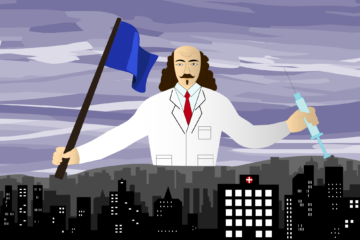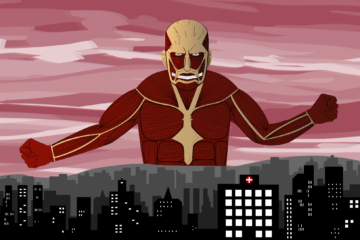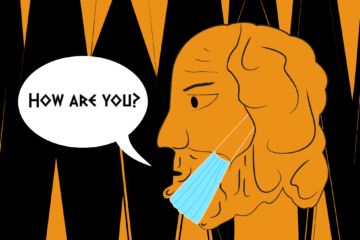In the past five years, Malta has witnessed a wildfire of corruption revelations – from money laundering to outright assassination. On the one hand, there remains a total absence of radical change in domestic political culture, yet each time the corruption-of-the-month is revealed, in spite of the evident apathy, one notices a discernible element of scruple that is consistently expressed in political discourse, like a routine call to prayer. Therefore I find myself asking the question: how does corruption become this self-evident tumour which establishes itself as a natural organ of the body?
The 24-hour marriage: do I ask for my gift back?
Given the lax fiscal culture of the country, it is hard to imagine that one can get so riled up simply because of some pilfering of tax-money. I tell myself that there has to be something else behind the expressed consternation. And what I do observe, is rather an element of trauma, the exposure of the well-known but ignored fact, that behind all the empty political gestures we practice everyday, lie wicked, selfish intentions.
The trauma occurs at a rather symbolic level: it is the attestation that somebody has just shat on our adherence to rituals, the equivalent of having to sit through a whole wedding ceremony only for the couple to get divorced the next day. The traumatic event is the slap on the face for all the individuals who, as cynical and unreligious as they might be, had to pretend that the rituals they sat through had significance and that their tiny sacrifice was for some greater collective cause – be it the institutions of marriage, family, corporate ethics or the state. Furthermore, it brings to shambles all that an individual might have hoped to gain from supporting the institution through rituals, which could be monetary, but also social/political capital gained from the symbolic power of joining the other family, of being the best-man, of being remembered for giving the best wedding speech about this everlasting bond, and so on.
The divorce, or the exposed corruption, is traumatic not because of the shock we get from the news that a marriage has ended, or that a politician turned out to be corrupt; can we be really shocked anymore about such ordinary news? Unless one is out of touch and un-informed, their scrupulous reaction is rather the fear that a big reactionary change may come about and truly change things as they stand and as we currently benefit from them. The scrupulous response is thus a mere counter-ritual, a pretension that such a case is out of the ordinary, which is meant to preserve the old rituals and deny the trauma; it seeks to solidify the institutions and to declare the disruption as an anomaly that should not happen again. As revolutionary and as passionate as the counter-ritual may sound, its primary purpose is to strengthen the status-quo and deny the trauma. In this sense, the bad news is traumatic precisely because it destroys, in public view, the noble lie that we all implicitly agreed to adhere to, with the calculated risk that we stand to gain from it.
Rituals as means to security
In fact, the counter-ritualists can often be seen to criticise the ‘tribal’ partisan interests which justify the contraventions through such petty excuses as ‘the opposition is more corrupt’ or ‘this marriage only failed because of the bride’s alcoholism’. Criticism of such apologetic positions may be right on several accounts, particularly in pointing out the closed-circuit thought that is bereft of critical reflection. Yet what it does neglect is the traumatic element due to which this denial occurs.
In fact, both sides, as much as they seem to be opposed to each other, are still allies in one particular thing, the denial of the exposition that there are inherent inconsistencies in the given institution. They both agree that the institution must be preserved and their quarrel is only that the non-critical side seeks to somewhat excuse the offending individual, whereas the counter-ritualist seeks to find a ‘systemic’ solution by which the practical implementation of the noble lie is fixed. Yet neither of the two will point out the fundamental inconsistency on which the entire debate is even established.
Of course, one can understand and accept this reality out of very practical political considerations that these proponents can be assumed to undergo – consciously or not. My argument is that they all stand to lose a lot if the system is revolutionised further, and a colossal disruption is usually not worth the gamble. Be it petty financial and identity stability or professional and social standing, both tribal partisans and counter-ritualists stand to lose as individuals subjects. For these two sides, committed to rituals in one way or another, the status quo must only be shaken up to a certain point, and in the direction that suits their security.
Individuals uniting for some form of status quo is not necessarily bad, and revolution is not necessarily the answer. My argument is rather an attempt at a prudent ad hominem critique in order to contextualise the limits of the political debate so that it does not not limit the intellectual one. It would probably be too idealistic to expect humans to break through the realm of rituals and symbols and to speak a language free from ideology, most especially while we are seeking to communicate and build a consensus as a society. But at least, in our intimate reflections, we can employ this curse at the service of comprehending the dictum – not to say the absurdity – that contemporary debates assume. In other words, the philosophical inquiry has to go further from the hegemonic vocabulary of the loudest voices in the political sphere. The main goal of this inquiry is to identify the fundamental ideological inconsistencies which the mainstream debate orbits.
Born to cooperate, Dying to compete – the inconsistency
What are these fundamental inconsistencies, one might ask? While that is a whole topic for another time, I can at least point a finger towards the presumptions on which liberal-democracy is based and which concern corruption. In a nutshell, I can point out that this ideology presupposes goodness as being natural to individuals for as long as they exist in a just system, but at the same time it remains philosophically and historically built on the paranoia that there will inevitably be bad individuals who will seek to take this justice away from the rest. The identity of the individual subject in liberal democracy is therefore hysteric: it is placed at the centre of the universe on account of its inherent – almost divine – goodness, but on the other hand it is fait accompli suspected of seeking to dominate the remaining 99% of the people.
One can start seeing a kernel for populism in this same ideology: in this respect, populism is nothing other than an antithesis seeking to bring into positive existence, the obscure threat by some scheming individuals, which threat mainstream politics so vehemently denies and negates. It is the inevitable symptom of the inconsistency. In the more specific scenario of corruption, the shortcoming of liberal democracy is that on the one hand it posits the dream that free cooperation and unregulated trade is the root of the wealth of civilization, but on the other hand an obscure Leviathan knows very well that humans are greedy and must be protected from each other, especially from the most ambitious of their species.
The existence of the liberal state depends precisely on the negation of its own utility and the masking of this paradox is identifiable in the propagandistic rituals hailing the goodness of the naturally-cooperative free individuals. Liberal democracy is based on the fantasy that from selfish interests arises a universal welfare, that trade prevents warfare, and so it gives rise to the fetish for a Law that in-itself can deliver that justice… if followed. If not, then the people are to be forcibly made free.
The Greatest and Noblest lie: “I do not shit”
This ritualistic screen is not just an idiot’s fantasy (although such naivety surely exists among some), but a necessary lie we tell each other, so that chaos remains in a harness and so that we do not descend into pure anarchic free-for-all looting. The latter scenario would be against the interest of anybody who has something to lose, which in times of relative prosperity means most people. The violent eruptions that occur in times of high social tension precisely demonstrate the fragility of the noble lie, which is momentarily put aside until the armed forces of the state intervenes to restore the balance. But in peaceful and ordinary times we simply accept the lie, to our benefit. Sometimes, the lie is believed too much, out of necessity.
Going back to Malta, think of the average citizen who, in the last five years has seen their individual interests catered-for by government policies; be it a boost in the industry of their profession, recognition of their hobby, the granting of civil rights to their social identity, a long-awaited legalisation of pleasures that were previously scorned, granting of benefits to their religion, and so on. After the point of gaining, what the individual requires the most from politics is status quo.
The traumatic moment obviously happens when it surfaces that the politicians who granted these benefits and the status quo that followed them, have been dependent on corruption circles all this time. Yet it is not uncommon that the attachment to status quo is strong enough that the individual undergoes a narrative-adjustment by which it is claimed that “that politician cannot be corrupt” (i.e. he is holy), or “it was only the people around him that took advantage of him”, or most cynically, “these are just dirty tricks by an opposition thirsty for power”.
It is this last claim that interests me the most, particularly because while its intended illocution (i.e. that the government is genuine) is obviously not true, the content of the proposition pretty much is: the opposition is simply seizing a political advantage, and to assume that it has a divine mandate to start a crusade against corruption would be folly. Those who would benefit more from a change in administration are happy to believe that the current government is corrupt, but change would mean that someone else must occupy that place, someone who is the logical negation of the current government, whose dialogical relationship means that they must be not-corrupt. And thus one can realise that whether one refuses to believe that the current administration is corrupt, or whether they protest openly against it, they are still enforcing the same noble lie, that a government can and should be not-corrupt. And this is the most fundamental logic of democratic rule-of-law.
As to those who claim that their political participation is thoroughly motivated by ethical principles, then I say that they are comfortable enough that they do not perceive any threat to their position (yet their deeper selfishness stands to be revealed in disruptive times), and/or they occupy a social position whose standing demands the same cloak of righteousness. In the latter case, the most obvious roles that come to mind are traditional ones such as politician, priest, parent, teacher… anyone whose task is precisely to influence and impart the noble lie onto those who follow and look up to them.
But the word ‘follow’, in the age of social media can give us deeper insight: in various senses, we are all influencers. That is, we all have a public persona that aspires to be recognized and to recognize itself through the gaze of the Other. In this sense we start to realise, that we are all bullshitters, and if everyone shits, then shitting is no longer something to feel guilty of, although you still have to do it in private, behind the curtains. These curtains are what keeps the ideology fully functional while at the same time completely denied by all those who practice it. In Peter Sloterdijk’s terms, the cynical ideological subjects know it, but they are doing it anyway, just as if they did not.
The Sacrificial Fox
So what about these corrupt conniving foxes who are caught red-handed? What do we do with them? The answer: the same thing that we do to celebrities who are caught cheating on their spouses, or when a masturbator forgets to close the window facing the street, allowing us a rare gaze into the ordinary private acts that we always shut from public view – as if they do not happen. We undergo a perverse enjoyment from the fact that our fetish for Law has been publicly subverted, confirming the humanity behind what we also do in private, but cannot disclose due to the rituals. For just a moment, we witness the myth of public-private separation, but which soon after becomes a trauma meant to be cauterized.
Therefore, the only possible reaction must assume the form of the same rituals meant to be protected: a ritual of purification. The protests against corruption take the shape of “How dare you steal from us!”, but what they’re really saying is “How dare you get caught!”. The captured fox becomes the sacrificial symbol for a perverse kind of Passover, the crucified one who died for our sins, so that we may wake up on Monday and start the week with a clean conscience ready to screw the government, the planet, each other, once again.
So, at the end, once the corrupt fox is being crucified, it will shout “forgive them father, even though they know well what they are doing”.



1 Comment
Harald Bongwater · 19 April 2021 at 8:01 am
To my mind these increasingly decrepit rituals of accountability and transparency are remnants of a time where politicians could not so easily govern in spite of themselves (their corruptions and proclivities). There are two main reasons why I view this to be true. First of all, Europe or the West, including Malta, is experiencing a time where the majority of people are afforded enough “value,” to either have the hope of acquiring more, or fear loosing what they already have. The elite “agreement” or “understanding,” whereby they play at leadership, is tacitly supported by the people, so long as they have more to loose than they stand to gain by revolution (breaking the agreement). However, in less certain or satisfying times, the “agreement” must be, in turn, more competitive at selling a vision and keeping up appearances. The stagnance or sterility of current politics can be attributed the fear of loosing what we have, at the expense of efficiency and progress.
The second point, perhaps best applies to Malta but is also relevant elsewhere. The representativeness of governance has become increasingly obsolete in times of supranational concerns and responsibilities, many countries could be more successful governed by appointed functionary magistrates than by unpredictable elected officials. At least magistrates can be held accountable to something more than their popularity. The result of this devolution of representative democracy are leaders who serve only as placeholders in a political and economic status quo. Politicians and voters alike are obviously aware of their inconsequence within the greater framework, as you suggest this leads the increasing revelation of shit. However, the rituals of political correctness* are a remnant of a time when national sovereignty was the ground upon which politics operated, and when there was still a diversity of paths down which nations could progress.
The uninspiring organs of ideology are laid bare for all to see because ideology does not need to be inspiring. Much of the West has recognized itself as the global middle class, more afraid of loosing that status than of wanting political vitality.
*haha